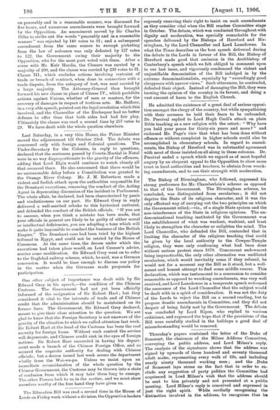On Friday week the concluding clauses of the Trade Dis-
putes Bill were debated in Committee in the House of Commons. Clause II., which legalises picketing when carried
on peaceably and in a reasonable manner, was discussed for five hours, and numerous amendments were brought forward by the Opposition. An amendment moved by Sir Charles Dilke to strike out the words "peaceably and in a reasonable manner" was rejected by 140 votes to 91; and a subsequent amendment from the same source to exempt picketing from the law of nuisance was only defeated by 127 votes to 122, the Government owing their majority to the Opposition, who for the most part voted with them. After a scene with Mr. Keir Hardie, the Closure was carried by a majority of 200, and the clause was carried by 238 votes to 31. Clause III., which excludes actions involving restraint of trade or breach of contract, when done in connection with a trade dispute, from the category of tort, was next carried by a large majority. The Attorney-General then brought forward his new clause in place of Clause IV., which prohibits actions against Unions, whether of men or masters, for the recovery of damages in respect of tortious acts. Mr. Balfour, in a very able speech, pointed out the legal revolution which this involved, and the Chancellor of the Exchequer had no better defence to offer than that both sides had had fair play. Ultimately the clause was read a second time by 257 votes to 29. We have dealt with the whole question elsewhere.



































